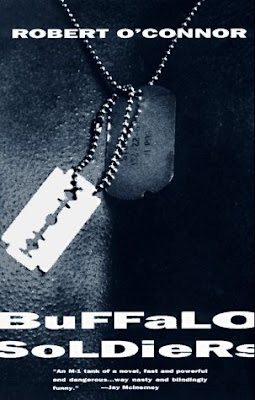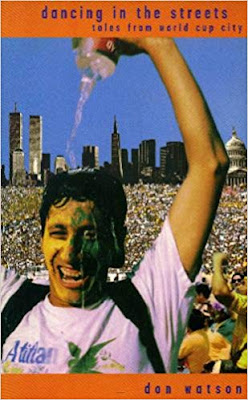Robert O’Connor - Buffalo Soldiers
London: Flamingo,
1993
Why is this book on the bedroom floor? - I first saw the film adaptation of this novel in
about 2003, a couple of years after its release. I hadn’t heard of it at the
time, which I’ve since discovered is because it was released slap-bang in the
aftermath of the September 11th attacks, and given its robust criticisms of the
US Army and the dark underlying themes therein, it sank more or less without
trace. As far as I know it’s not yet a cult hit, which is a shame because it’s
a solid and fairly faithful representation of the novel.
Nevertheless, it was the film which pointed me in the
direction of the book, but I’m also a bit of a Cold War enthusiast, so because
the film is set ostensibly in the months just before the Berlin Wall fell, I
thought I’d get hold of a copy and then ignore it for about a year, as is my
custom.
About
the Author
- Robert O’Connor is a man of mystery. Although Buffalo Soldiers was
seen as a promising debut fashioned in the tank-tracks of Catch 22 and
the nihilistic spirit of Bret Easton Ellis, he doesn’t appear to have done much
else. Even his author page at Random House doesn’t load properly, and on
Goodreads he seems to have branched out into writing books about specialist
diets.
Plot - written in the
second person (as in, ‘You do this, you think this’ etc), the novel follows the
exploits of Specialist Ray Elwood, battalion clerk and dogsbody to General
William C. Berman of the 57th Army, sometime around the fag end of the Cold
War. A petty criminal and black marketeer, Elwood is a conduit for the
production and sale of high-grade heroin and much besides, all the while
maintaining his hold over the incompetent Berman. However, following the
arrival of a new Staff Sergeant, Robert E. Lee, Elwood’s life becomes
complicated. Ostensibly there to look into the death of one of Elwood’s
addicts, Parsons McCovey, Lee is an ex-junkie wise to Elwood’s manouverings,
and the two begin to bang heads in their battle for the soul of their Army.
Into the middle of this drops Lee’s daughter Robyn, recovering from an
amputation of her arm and seething at the father she feels is responsible. When
you add a huge mound of opium, the cooking of which could allow Elwood to leave
the Army with several million dollars, you have an explosive mixture.
Review - Immediately, the
use of the second-person narrative hits you between the eyes: how many
novelists, particularly debut authors, would dare use it? It’s a style of
writing I’ve always been uncomfortable with, particularly to write with,
because I find it exhausting, that mixture of being your own omniscient
narrator. That said, O’Connor’s use of it allows us to get the best of both
worlds, getting the reader closer to that heart of darkness while also being
able to explain the finer intricacies of drug production. That removal makes us
unsure whether or not we like Elwood: he’s not trying to do his job in
difficult circumstances, but neither is he making excuses for his reprehensible
use of everybody he touches. One of the novel’s themes is detachment in the
form of lying to ourselves, and the second-person perspective affirms that
Elwood is the narrator in a life he doesn’t particularly like to live, hence
the desperation to see his final cook to fruition and disappear for good.
So far, so undergraduate. But is Buffalo Soldiers
an exercise in technical skill only? Happily, the real strength of the novel
lies in its frustration, and it’s through those listless arteries where we
really see O’Connor’s writing shine. ‘It is November, and Novembers in Germany
remind you of the sadness and despair of a fallen woman.’ That’s the novel’s
second line, and there is so much in that image that doesn’t need to be said
about the pointlessness of fighting a war that doesn’t have the energy to
happen. So much of what makes Elwood an interesting protagonist is what he
doesn’t say. In a lot of ways he feels like a depressive rather than a
desperate man, closing himself off to what he really feels and thinks. This is
why he puts himself into sidelines which could cause the greatest amount of
harm, rather than say skimming off canteen supplies. At the bottom of one’s
reserves of self-respect, only strong emotions register. Elwood doesn’t deny
his nature because of the drug he takes, it’s the drug which gives him a reason
to keep going.
Of course, getting us to side with a heroin-peddler is
a tough ask, and O’Connor doesn’t ask us to choose. Rather deftly, his
antagonist Sgt. Lee is the beta to Elwood’s alpha. If Lee had been a
straight-up, parade ground shitkicker, you might have been tempted to come over
to Elwood’s way of thinking and this would have been nothing but Hogan’s
Heroes: The Novel, but Lee is Elwood cured over oak. He’s been treated for
drug addiction and now his eyes burn with hatred because of it. As an ex-smoker,
I try not to judge others that still have the habit because there’s little
worse than an evangelical born-again, but Lee is this and more besides: he
wants to bring Elwood down because of the war inside of himself. Late in the
novel he confesses to Elwood his love of fighting in the Vietnam War because he
could do what he chose without consequence, but it’s his excess which has
caused most harm in his own life. Given the choice Lee would kill without
pause, but the proper way of doing things has been forced into him cold turkey,
and that’s why he cannot abide Elwood - how dare I have to moderate while this
fucker runs free?
Without Lee’s dichotomy, his daughter Robyn wouldn’t
have had the accident that brings her to West Germany and into Elwood’s life.
Contracting gangrene from a badly-set broken arm, Robyn has recently had an arm
amputated, which wouldn’t have happened had Lee not spent an evening working
rather than getting her discomfort checked. Robyn stresses that she has not
gone off the rails because of any residual hatred, but soon enough she has
padded up for Elwood’s side. At first, Elwood sees her as his way to defeat Lee
- his ‘key’, a strong Elwood theory - but falls for her pretty quickly. In some
ways Robyn is his saviour, forcing his head above water for the first time in
years, but she’s a fallen angel, with her imperfections, her school expulsions
and her readiness to get involved in drug distribution. This is not the
standard ‘rogue uses unsuspecting girl and comes to love her’ trope; Robyn
becomes Elwood’s weakness because of her own strength. Had she asked him to
change he probably would do so, but the only way he can live a normal life with
her is to finish his heroin cook, opening him out to huge risk. Early on in the
book Elwood spends the night at a brothel with a girl he comes to like in an
aesthetic sense, but she can never be his, because she won’t open herself to
him. Robyn does, but even then we don’t really believe her, whereas Elwood is a
simple man in the end - he’s a tired, outdated piece of military technology who
doesn’t have the capability to fight a modern war.
Beyond the parameters of this skirmish, Buffalo
Soldiers really is as simple a plot as bored soldiers waiting for something
to happen. There’s racial tension there, which in a war situation probably
wouldn’t be such a factor, but nobody knows what the battalion is doing in West
Germany, and as the old saying goes, the devil makes work and all that guff. A
particularly good chapter is when Elwood and his squad are sat around watching
a mucky video and shooting the shit - you really do get a sense for the
fragmented, badly-constructed conversations people who don’t have anything in
common besides their place of employment have. They care about passing the
time, not getting to know one another. It’s all a waste of time, so in that
environment, who wouldn’t choose to get out of their heads or do something less
boring instead?
Simply put, Buffalo Soldiers is a forgotten
gem. Plot-wise, it’s pretty thin - wrong’un tries to pull off huge drug deal
against the odds - but the book’s about a lot more than what Elwood does, and
more about what he feels. His motivation is interesting, as it moves from
boredom to money to love. The quotation that both book and film use is “When
there is peace, the warlike man attacks himself”, said by Friedrich Nietzsche,
but here’s the thing: man is inherently warlike. Buffalo Soldiers
recognises this, and it’s a book about conflicts both real and imagined. For
all of the posturing that went on during the Cold War, its battles were limited
rather than involving the entire planet, and so it goes here - in the end, the
boneheaded Colonel Berman, obsessed with his epaulettes, misses what’s going on
right on front of his nose: his base, infested with drugs, small arms deals,
pornography and no-go areas, plays host to two evenly-matched combatants,
neither of whom could rally anybody to their bloody standard.
Will
I move it from the floor to the bookshelf? - Absolutely.




Comments
Post a Comment